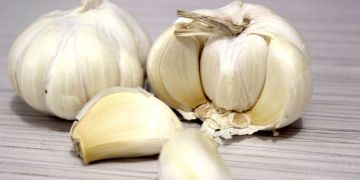Garlic contains many sulfur compounds which detoxify the body, boost the immune system, lower blood pressure and improve circulation. Garlic has also demonstrated anti-cancer, antibacterial, anti-fungal and anti-oxidant effects.
Garlic can stimulate the production of glutathione, an amino acid which is known to be a very potent antioxidant and de-toxifier. See also our article on NAC for more gluathione info. Antioxidants help scavenge free radicals.
Free radicals
Free radicals are particles that can damage cell membranes, interact with genetic material and possibly contribute to the aging process as well as the development of a number of conditions including heart disease and cancer. Free radicals occur naturally in the body but environmental toxins (including ultraviolet light, radiation, cigarette smoking and air pollution) can also increase the number of these damaging particles. Antioxidants can neutralize free radicals and may reduce or even help prevent some of the damage they cause over time.
Atherosclerosis
The smooth muscle relaxant Adenosine is found in garlic and this seems to help lower blood pressure. Garlic is also used to help prevent atherosclerosis (plaque build up in the arteries causing blockage and possibly leading to heart attack or stroke), reduce colds, coughs and bronchitis.
Studies suggest that fresh garlic and garlic supplements may prevent blood clots and destroy plaque. Blood clots and plaque block blood flow and contribute to the development of atherosclerosis. Blockage of blood flow to the heart, brain and legs, can lead to heart attack, stroke, or peripheral vascular disease (PVD). People with PVD experience pain in the legs when they walk and move. If garlic does reduce the build up of plaque then strokes, heart attacks and PVD may be less likely to occur in people who eat garlic or take garlic supplements.
High Cholesterol and High Blood Pressure
A number of studies have found that garlic reduces elevated total cholesterol levels and lowers blood pressure more effectively than placebo. However, the extent to which garlic is effective is small.
Diabetes
Garlic has been used as a traditional dietary supplement for diabetes in Asia, Europe and the Middle East. Preliminary studies in rabbits, rats and limited numbers of people have demonstrated that garlic has some ability to lower blood sugars. More research in this area is needed. (See Notes regarding some concern about using garlic with certain diabetes medications.)
Common Cold
A well-designed study of nearly 150 people supports the value of garlic for preventing and treating the common cold. In this study, people received either garlic supplements or placebo for 12 weeks during "cold season" (between the months of November and February). Those who received the garlic had significantly fewer colds than those who received placebo. Plus, when faced with a cold, the symptoms lasted a much shorter time in those receiving garlic compared to those receiving placebo.
Cancer
Test tube and animal studies suggest that garlic may have some anti-cancer activity. Observational, population-based studies (which follow groups of people over time) suggest that people who have more raw or cooked garlic in their diet are less likely to have certain types of cancer, particularly colon and stomach cancers. Dietary garlic may also offer some protection against the development of breast, prostate and laryngeal (throat) cancers. However, these types of cancer have not been as extensively studied as colon and stomach cancer.
Tuberculosis
Numerous test tube studies have demonstrated that garlic extract inhibits the growth of different species of bacteria, including Mycobacterium tuberculosis, the organism responsible for tuberculosis. Very high concentrations of garlic extract were needed to slow down the growth of M. tuberculosis in these studies, so some experts are concerned that these levels may be toxic to people. While further research in people is needed, one animal study found that garlic oil also inhibited M. tuberculosis and reduced lesions in the lungs of these animals.
Intestinal Parasites
Laboratory studies suggest that large quantities of fresh, raw garlic may have antiparasitic properties against the roundworm, Ascaris lumbricoides, which is the most common type of intestinal parasite. Garlic for this purpose, however, has not yet been tested in people.





